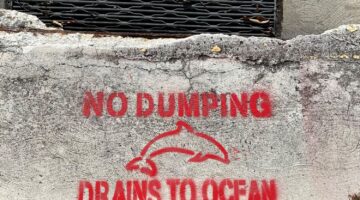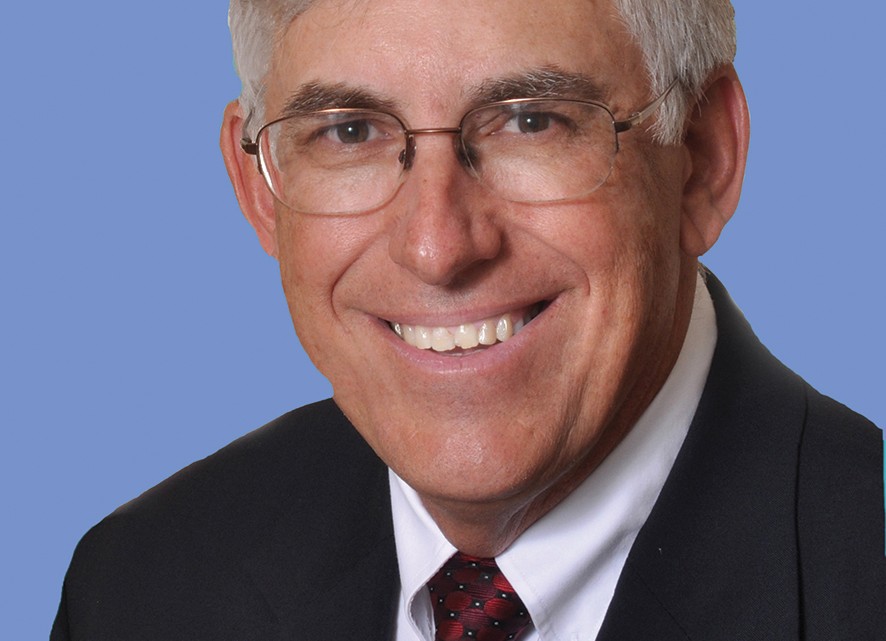Kirk Zuelch: Keeping the taps running at the Aqueduct Authority
BY TERRY SCHMIDA
There are a series of photos on the wall of Kirk Zuelch’s Kennedy Drive office which always elicit a smile from the Florida Keys Aqueduct Authority’s executive director.
The photos, which Zuelch took one year during a vacation in France, are of the Pont du Gard, an ancient Roman aqueduct near Nimes, which once carried some 44,000,000 imperial gallons of water per day, to the citizens of that town.
“It hasn’t been in use for hundreds of years, but it worked for a very long time,” Zuelch said, with a smile. “And it’s still standing. A remarkable piece of infrastructure.”
Zuelch’s interest in the aqueduct is understandable. Not only has the agency which he heads been in the midst of some major infrastructure improvements lately, but Zuelch has cultivated a reputation over the 43 years he’s lived in the Keys for for immersing himself in his work, and going the extra mile for those he serves.
As the county’s state attorney, from 1980 to 2000, the Michigan native established a teen court program, as well as the truancy prevention, juvenile diversion, domestic abuse prevention advocacy, and volunteer victim advocacy programs. He also contracted with the Florida Department of Children and Families to provide attorney services on their behalf, and taught numerous seminars on victim’s rights law to lay people, law enforcement, and prosecutors, throughout the state.
As a private citizen he has donated his time to the Boys and Girls Club of the Florida Keys, the United Way of Monroe County, the Florida Keys Children Shelter, the PACE Center for Girls, the Guidance Care Center, and others.
And as the executive director of the FKAA since 2011, Zuelch has presided over the aforementioned expansion of infrastructure throughout the county including sewer construction in Big Pine Key, pipe replacement in Key West and, on the horizon, enlargement of the reverse-osmosis desalination plant on Stock Island.
“Very soon when the residents of Big Pine and No Name keys are hooked up to the sewer, we’re going to be centrally connected from Ocean Reef to Key West,” Zuelch said. “At that point, we’re really hoping that this huge public investment will prove its worth.”
And at that point, Zuelch and the FKAA will be able to focus more intently on maintaining existing infrastructure and, with the recent debacle in Flint, Mich., in mind, ensure the continued quality, and steady supply of, Monroe County’s water supply.
“We’re very lucky in Florida to have an ample supply of good quality fresh water,” Zuelch said. “In fact, the FKAA has won the award for having the best-tasting water in South Florida three years running. We’ve certainly been doing done some extra water quality testing in the schools, and, of course, our customers are welcome to call us anytime for a free quality test at their homes. I suspect that in the coming years you’re going to see some major changes in national water standards.”
While the steel, ductile iron and plastic water pipeline that brings some 17 million gallons of the life-giving liquid, per day, down the Keys from the source plant in Florida City was built fairly recently – in 1979-80 – there are older pipes in such places as Old Town that are well past their prime. Zuelch said that the utility does its best to coordinate with state and local governments to replace those sections of pipe during construction projects.
“We took advantage of the work that was going on on White Street and Caroline Street, and on North Roosevelt Boulevard, to replace the pipes there,” Zuelch said. “We’ve also replaced sections of pipes in Grassy Key, Islamorada, and Key Largo. The upkeep of our infrastructure is a continuous process.”
Looking to the future, Zuelch said the FKAA will be working closely with the Florida Department of Transportation to ensure the safe and steady delivery of Florida Keys water. Before too long, according to Zuelch, cross-county pipes will likely be laid beneath the seabeds instead of along the bridges, as is currently the case. In addition, where pipes do run along the bridges, temporary piping of a flexible plastic variety may be employed in the event of a bridge failure, in order to keep the Keys in water, until permanent repairs can be effected.
Already, in the event of a bridge collapse, agreements are in place to get the structure – and the accompanying water line – up and running again as soon as possible.
In the meantime, however, Zuelch and his crew of “good people, good workers” will work diligently to construct and maintain infrastructure that can stand the test of time – if not for quite as long as the Pont du Gard in France.
“At the end of the day, it’s all about keeping the water on, no matter what happens,” Zuelch said. “Even during Hurricane Andrew, we didn’t lose water. We intend to keep it that way.”
[livemarket market_name="KONK Life LiveMarket" limit=3 category=“” show_signup=0 show_more=0]






No Comment